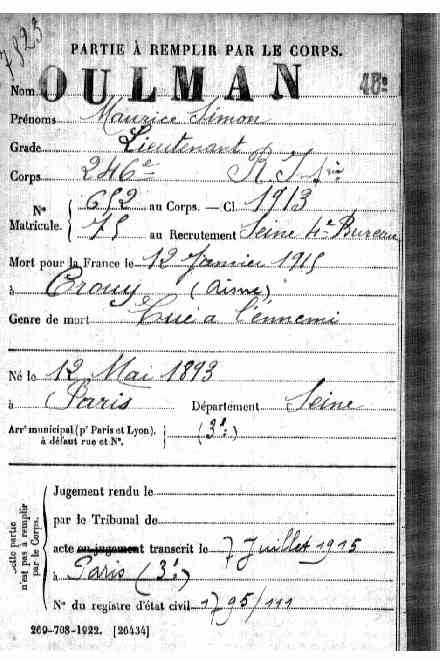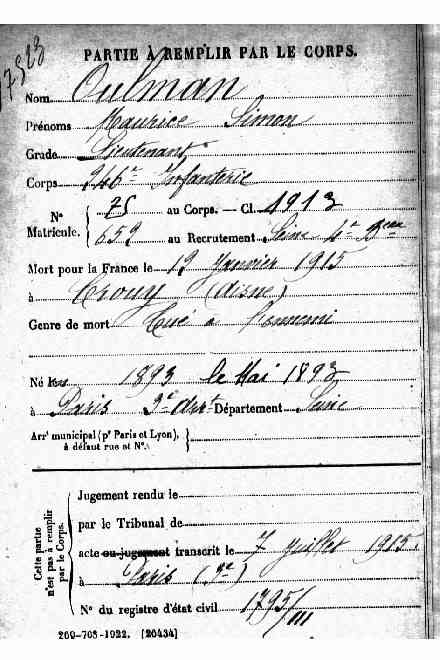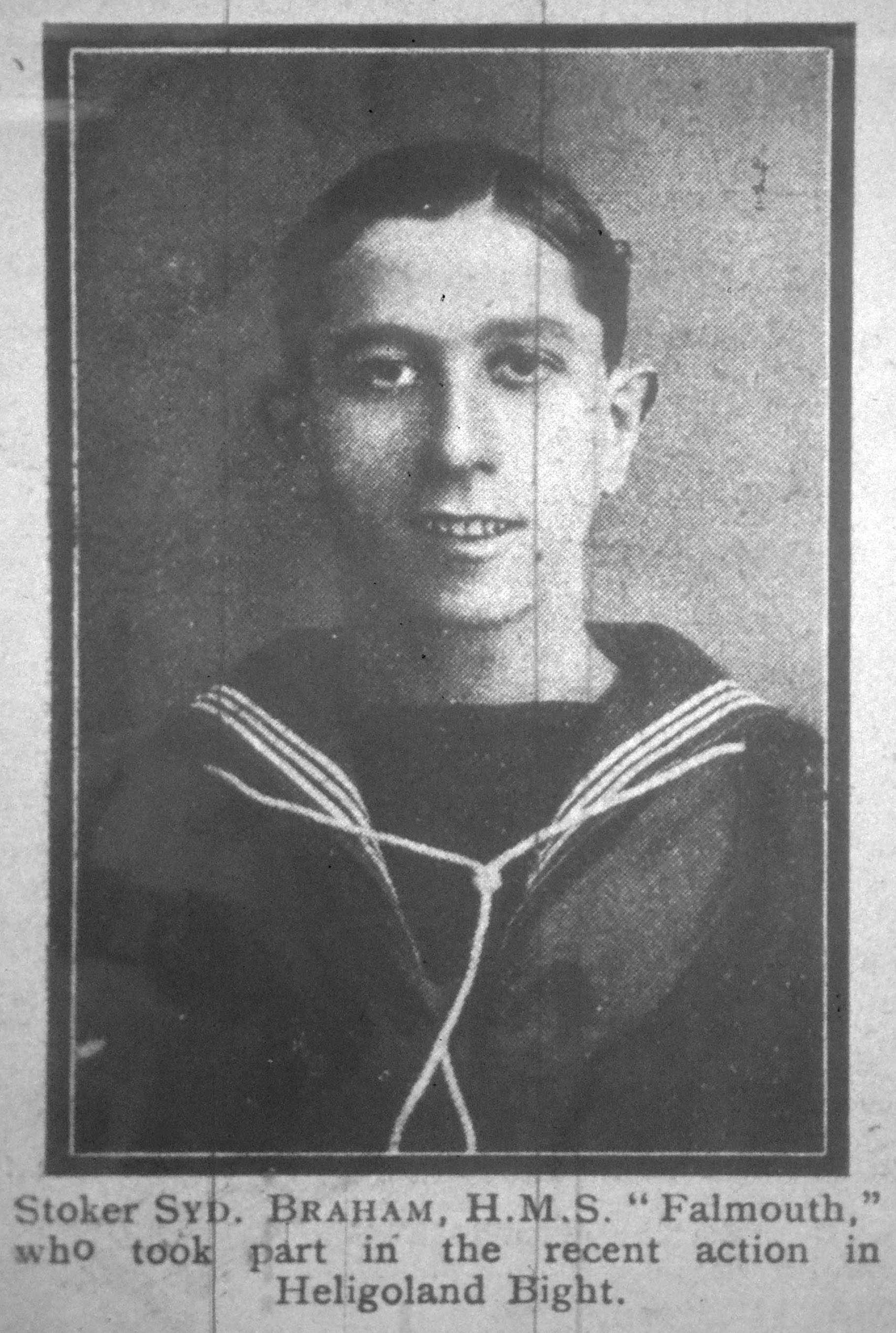In my prior post, I described the varied books published in Germany during, after not long after, the First World War, which covered the experiences of German Jewish soldiers through prose – soldiers’ letters and diaries – as well as statistics.
But, descriptions can go only “so far”.
This post presents the letter from soldier Martin Feist, of Frankfurt, which appears in Kriegsbriefe – gefallener Deutscher Juden.
____________________
Images of the cover of Kriegsbriefe – gefallener Deutscher Juden, Max Liebermann’s sketch, and Martin’s letter (outlined in red) on pages 19 and 20, are presented below:
 The book’s cover.
The book’s cover.
 The title page.
The title page.
 Max Liebermann’s art: An allegory of mourning.
Max Liebermann’s art: An allegory of mourning.
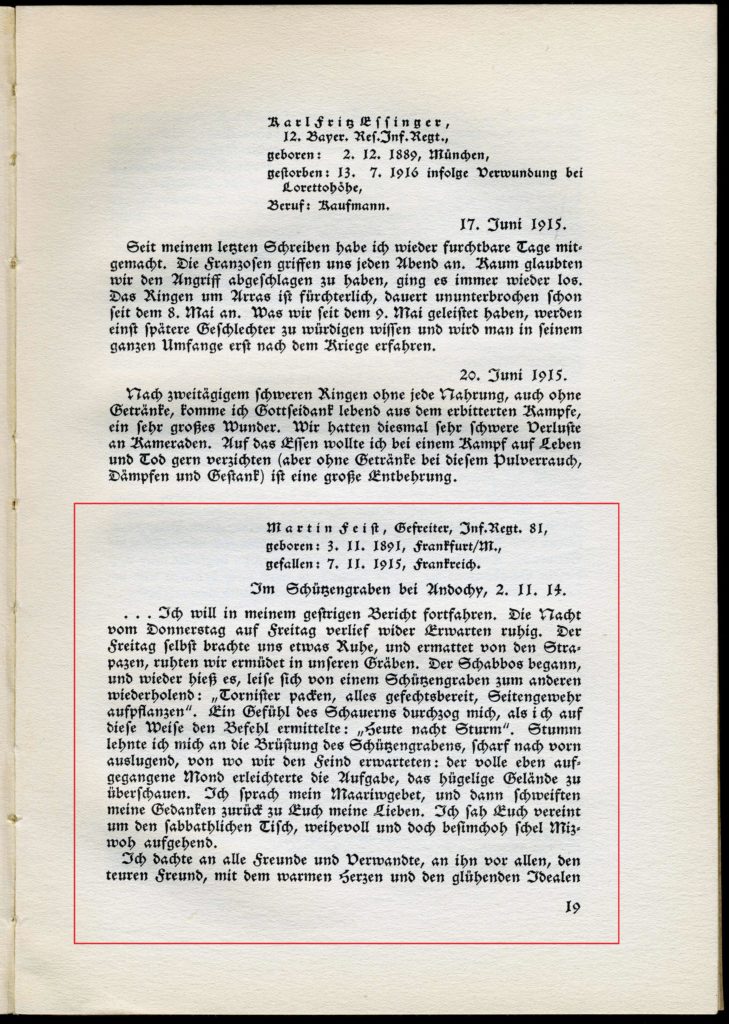 Excerpt of Martin’s letter, commencing on page 19. The format of the “header” – comprised of the soldier’s name, rank, and military unit; date and place of birth; date and place of death; date and place where the letter was actually written – is followed (with variations) for the 73 other writings in the book.
Excerpt of Martin’s letter, commencing on page 19. The format of the “header” – comprised of the soldier’s name, rank, and military unit; date and place of birth; date and place of death; date and place where the letter was actually written – is followed (with variations) for the 73 other writings in the book.
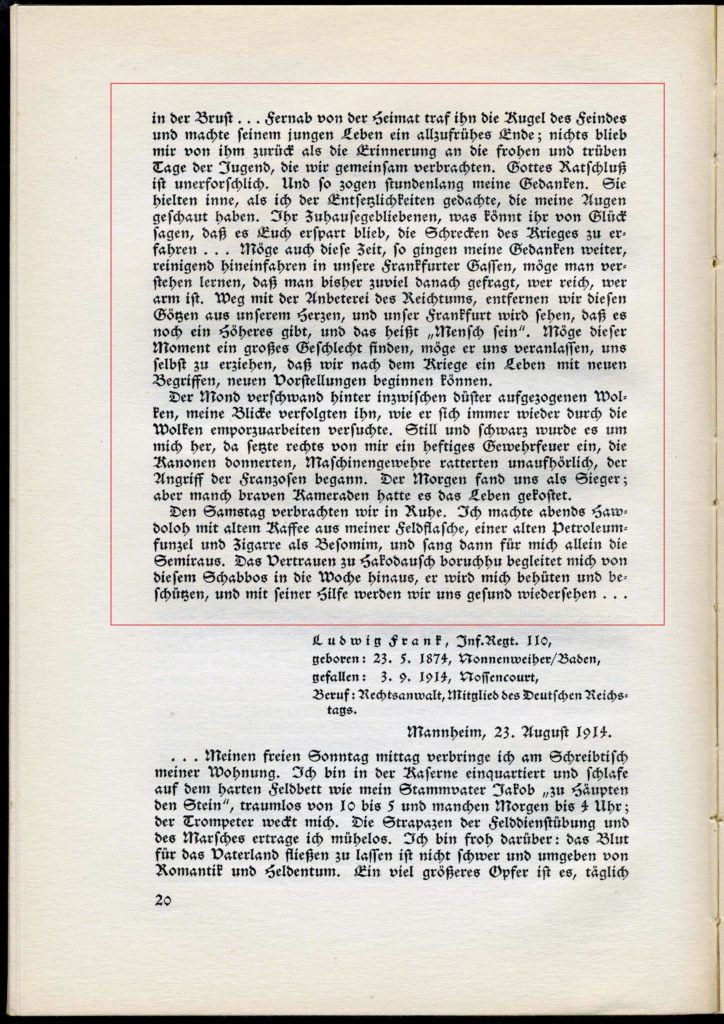 Excerpt of Martin’s letter, concluding on page 20.
Excerpt of Martin’s letter, concluding on page 20.
____________________
Martin’s letter, in German transcription and English translation, is presented below. (Note the ellipses, indicating sections of the letter which were deleted left unpublished. More about those in a moment..)
Martin Feist
Gefreiter
Inf. Regt. 81
Geboren: 3.11.1891, Frankfurt / M.
Gefallen: 7.1.1915, Frankreich
Martin Feist
Corporal
81st Infantry Regiment
Born: November 3, 1891, Frankfurt on Main
Fallen: January 7, 1915, France
Im schützengraben bei Andochy, 2.11.14
In a Trench at Andochy, November 2, 1914
…Ich will in meinem gestrigen Bericht fortfahren. Die Nacht vom Donnerstag auf Freitag verlief wider Erwarten ruhig. Der Freitag selbst brachte uns etwas Ruhe, und ermattet von den Strapazen, ruhten wir ermüdet in unseren Gräben. Der Schabbos begann, und wieder hiess es, leise sich von einem Schützengraben zum anderen wiederholend: “Tornister packen, alles gefechtsbereit, Seitengewehr aufpflanzen.” Ein Gefühl des Schauerns durchzog mich, als ich auf diese Weise den Befehl ermittelte: “Heute nacht Sturm.” Stumm lehnte ich mich an die Brüstung des Schützengrabens, scharf nach vorn aus lugend, von wo wir den Feind erwarteten: der volle eben aufgegangene Mond erleichterte die Aufgabe, das hügelige Gelände zu überschauen. Ich sprach mein Maariw gebet, und dann schweiften meine Gedanken zurück zu Euch meine Lieben. Ich sah Euch vereint um den Sabbathlichen Tisch, weihevoll und doch besimchoh schel Mizwoh aufgehend.
…I want to continue in my report of yesterday. The night, from Thursday to Friday, was calm. Friday itself brought us some rest, and weary of the hardships, we rested tired in our trench. Shabbos began, and again it was said, quietly from one trench to the other: “Pack knapsacks, everything ready for battle, plant bayonets [seitengewehr 98].” A shuddering feeling ran through me when I understood the order: “Night assault.” Silently I leaned back against the parapet of the trench, leaning forward, from where we expected the enemy: The full moon, which had just risen, facilitated the task of surveying the hilly terrain. I spoke my Maariv prayer, and then my thoughts wandered back to you my dears. I saw you gathered together around the Sabbath table, sanctified, and yet sober, mischievous.
Ich dachte an alle Freunde und Verwandte, an ihn vor allen, den teuren Freund, mit dem warmen Herzen und den glühenden Idealen in der Brust… Fernab von der Heimat traf ihn die Kugel des Feindes und machte seinem jungen Leben ein allzufrühes Ende; nichts blieb mir von ihm zurück als die Erinnerung an die frohen und trüben Tage der Jugend, die wir gemeinsam verbrachten. Gottes Ratschluss ist unerforschlich. Und so zogen stundenlang meine Dedanken. Sie hielten inne, als ich der Entsetzlichkeiten gedachte, die meine Augen geschaut haben. Ihr Zuhausegebliebenen, was könnt ihr von Glück sagen, dass es Euch erspart blieb, die Schrecken des Krieges zu erfahren… Möge auch diese Zeit, so gingen meine Gedanken weiter, reinigend hineinfahren in unsere Frankfurter Gassen, möge man verstehen lernen, dass man bisher zuviel danach gefragt, wer reich, wer arm ist. Weg mit der Anbeter ei des Reichtums, entfernen wir diesen Götzen aus unserem Herzen, und unser Frankfurt wird sehen, dass es noch ein Höheres gibt, und das heisst “Mensch sein”. Möge dieser Moment ein grosses Geschlecht finden, möge er uns veranlassen, uns selbst zu erziehen, dass wir nach dem Kriege ein Leben mit neuen Begriffen, neuen Vorstellungen beginnen können.
I thought of all the friends and relatives, of him before all, the dear friend, with a warm heart and glowing ideals in his chest… Far away from home, the bullet of the enemy struck him, and made of his young life too early an end; nothing remained for me of him but the memory of the joyful and gloomy days of youth that we spent together. God’s decree is unsearchable. And so my thoughts went on for hours. They stopped when I thought of the horrors that my eyes had seen. Your own home, you can fortunately say was spared to remain, to learn the horrors of the war… May this time also, my thoughts went on, be a cleansing of our Frankfurter streets; may one understand, that one has asked too much about it so far, of who is rich; who is poor. Away with the worship of wealth; may we remove these idols from our hearts, and our Frankfurt will see that there is still a higher one, that is to say, “to be human.” May this great moment find a great lineage; may it lead us to educate ourselves that after the war we can begin to live with new things; can start new ideas.
Der Mond verschwand hinter inzwischen düster aufgezogenen Wolken, meine Blicke verfolgten ihn, wie er sich immer wieder durch die Wolken emporzuarbeiten versuchte. Still und schwarz wurde es um mich her, da setzte rechts von mir ein heftiges Gewehrfeuer ein, die Kanonen donnerten, Maschinengewehre ratterten unaufhörlich, der Angriff der Franzosen begann. Der Morgen fand uns als Sieger; aber manch braven Kameraden hatte es das Leben gekostet.
The moon disappeared meanwhile behind dark clouds; my eyes watched it as it tried to work its way up through the clouds again and again. There was about me stillness and blackness; violent rifle fire set in on my right, the cannons thundered, machine guns rattled incessantly, the attack of the French began. The morning found us as victor; but had cost the lives of many good comrades.
Den Samstag verbrachten wir in Ruhe. Ich machte abends Hawdoloh mit altem Kaffee aus meiner Feldflasche, einer alten Petroleumfunzel und Zigarre als Besomim, und sang dann für mich allein die Semiraus. Das Vertrauen zu hakodausch boruchhu begleitet mich von diesem Schabbos in die Woche hinaus, er wird mich behüten und beschützen, und mit seiner Hilfe werden wir uns gesund wiedersehen…
We spent the Saturday in silence. In the evening I made a Havdalah with old coffee from my canteen, an old petroleum fuse and a cigar as Besamim, and then sang the Zemirot alone. The trust to HaKadosh Baruch Hu accompanies me from this Shabbos forth into the week; He will guard and protect me, and with His help we shall be well again…
____________________
Kriegsbriefe – gefallener Deutscher Juden is not the only source of information about Martin.
Remarkably, the Center for Jewish History possesses the entirety of his correspondence, which (doubly remarkably!) includes the original text of the letter as excerpted in Kriegsbriefe – gefallener Deutscher Juden. Listed – appropriately enough – as the Martin Feist Collection, the documents, donated by Sonya Benjamin, are described as, “letters [sent] to his family over the course of two years, first as a businessman in Paris and then as a German infantryman in France.”
The collection is comprised of four sequentially arranged folders, covering 1913, 1914 (January to October), 1914 (November to December), and 1915. The first folder commences with a descriptive note penned by Sonya in 1991, contaning the following statements, “Martin, as did his 2 brothers, worked for the firm Beer-Sondheimer, both in Paris and in London, whence he returned home to enlist when war broke out in August, 1914. He stayed in close touch with his five brothers and sister. He was the second eldest. Their father had died in 1912.”
“The letters describe an arc of changing attitudes and emotions in the mind of a young German Orthodox Jew, well-educated in an affluent home, as he embraces the lifetstyle of a young businessman in Paris, then adapts to the life of a German infantryman, imbused by the righteousness of his cause, and finally experiences deep sorrow and disillusionment, tempered only by abiding faith.”
Thanks to the CJH’s policy of making the Martin Feist collection freely available in digital format, I was able to locate the letter from Kriegsbriefe – gefallener Deutscher Juden within the “3rd” folder.
The four pages of Martin’s original (typewritten) letter are presented below:
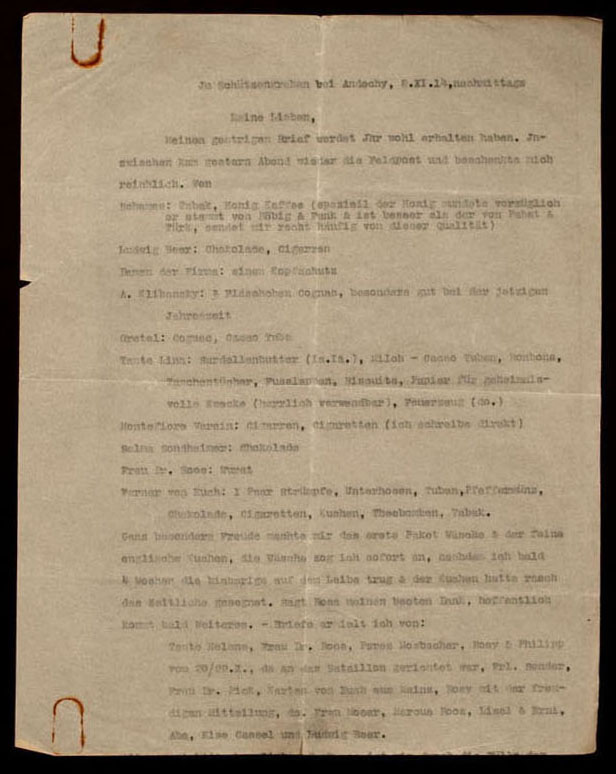 First page.
First page.
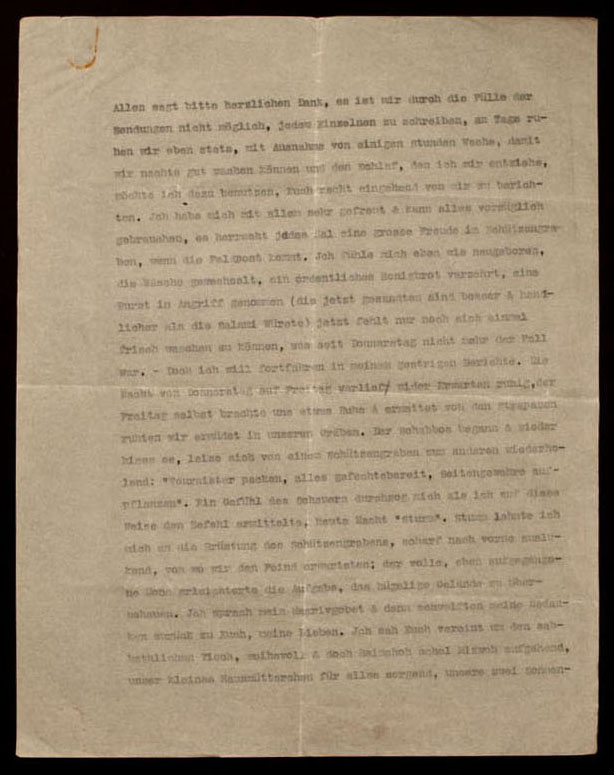 Second page.
Second page.
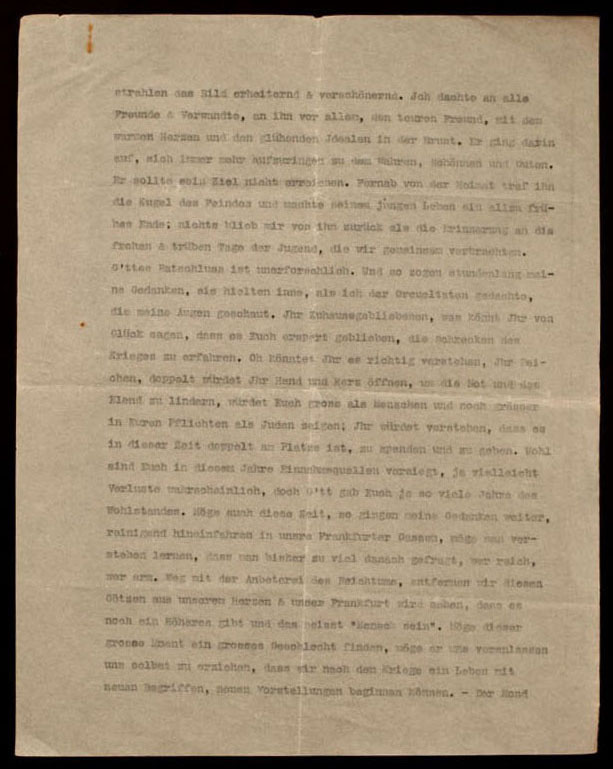 Third page.
Third page.
 Fourth, and final page.
Fourth, and final page.
____________________
This “full” version of Martin’s letter is – unsurprisingly – much lengthier than the book version, and in some parts is actually light-hearted. Amidst all, Martin retained a sense of humor.
More importantly, a careful reading and comparison of the two versions reveals where the editors of Kriegsbriefe – gefallener Deutscher Juden significantly redacted the original text.
For example in discussing an unidentified friend, the book presents, “I thought of all the friends and relatives, of him before all, the dear friend, with a warm heart and glowing ideals in his chest… Far away from home, the bullet of the enemy struck him, and made of his young life too early an end; nothing remained for me of him but the memory of the joyful and gloomy days of youth that we spent together.”
Martin’s actual statement is, “I thought of all the friends & relatives, of him before all, the dear friend, with a warm heart and glowing ideals in his chest. He began to rise more and more to the true, the beautiful and the good. He should not achieve his goal. Far away from home, the bullet of the enemy struck him, and made of his young life too early an end; nothing remained for me of him but the memory of the joyful & gloomy days of youth that we spent together.
Likewise, the book presents, “God’s decree is unsearchable. And so my thoughts went on for hours. They stopped when I thought of the horrors that my eyes had seen.“.
In the same place, Martin’s original letter has the following, “God’s decree is unsearchable. And so my thoughts went on for hours. They stopped when I thought of the horrible abominations that my eyes had seen.”
Other differences include the use of the word “and” in place of Martin’s liberal sprinkling of ampersand (“&”) symbols.
____________________
The transcription and my translation are presented below:
Martin Feist
Gefreiter
Inf. Regt. 81
Geboren: 3.11.1891, Frankfurt / M.
Gefallen: 7.1.1915, Frankreich
Martin Feist
Corporal
81st Infantry Regiment
Born: November 3, 1891, Frankfurt on Main
Fallen: January 7, 1915, France
Im Schützengraben bei Andochy, 2.XI.14, nachmittags
In a trench at Andochy, November 2, 1914, in the afternoon
Meine Lieben,
My dear,
Meinen gestrigen Brief werdet Ihr wohl erhalten haben. Inzwischen kam gestern Abend wieder die Feldpost und beschenkte mich reichlich. Von
You will probably have received my letter [of] yesterday. In the meantime the field post came yesterday evening and gave me plenty. From
Schames: Tabak, Honig Kaffee (speziell der Honig mundete vorzüglich er stammt von Röbig & Funk ist besser als der von Pabst & Türk, sendet mir recht häufig von dieser Qualität.)
Schames: Tobacco, honey coffee (especially the exquisite honey coming from Röbig & Funk is better than that of Pabst & Türk; send me this quality quite frequently.)
Ludwig Beer: Chokolade, Cigarren
Ludwig Beer: Chocolate, cigars
Damen der Firma: einem Kopfschutz
Ladies of the Firm: A head guard
A. Klibansky: 3 Fläschchen Cognac, besonders gut bei der jetzigen Jahreszeit.
A. Klibansky: 3 bottles of cognac, especially good at the present season.
Gretel: Cognac, Cacao Tube
Gretel: Cognac, cocoa [butter] tube
Tante Lina: Sardellenbutter (Ia.Ia), Milch – Cacao Tuben, Bonbons, Taschentücher, Fusslappen, Biscuits, Papier für geheimnisvolle Zwecke (herrlich verwendbar), Feuerzeug (do.)
Aunt Lina: Anchovy butter (yes, yes), milk – cocoa [butter] tube, sweets, handkerchiefs, sandals, biscuits, paper for mysterious purposes (gloriously usable), lighter (ditto.)
Montefiore Verein: Cigarren, Cigaretten (ich schreibe direkt)
Montefiore Club: Cigars, Cigarettes (I write directly)
Selma Sondheimer: Chokolade
Selma Sondheimer: Chocolate
Frau Dr. Roos: Wurst
Frau Dr. Roos: Sausage
Ferner von Euch: 1 Paar Strümpfe, Unterhosen, Tuben, Pfeffermünz, Chokolade, Cigaretten, Kuchen, Theebomben, Tabak.
Further from you: 1 pair of stockings, underwear, tubes, peppermint, chocolate, cigarettes, cakes, Theebomben [pre-mixed and packaged tea in jute bags], tobacco.
Ganz besondere Freude machte mir das erste Paket Wäsche & der feine englische Kuchen, die Wäsche zog ich sofort an, nachdem ich bald 4 Wochen die bisherige auf dem Leibe trug & der Kuchen hatte rasch das Zeitliche gesegnet. Sagt Rosa meinen besten Dank, hoffentlich kommt bald Weiteres. – Briefe erhielt ich von:
I was particularly delighted with the first package of underwear & the fine English cake; I immediately put on the underwear after I had worn the old one on my body for four weeks & the cake had swiftly blessed the time. Say my best thanks to Rosa; hopefully coming soon. – I received letters from:
Tante Helene, Frau Dr. Roos, Perez Mosbacher, Rosy & Philipp von 20 / 22 X., da an das Bataillon gerichtet war, Frl. Sender, Frau Dr. Pick, Karten von Euch aus Mainz, Rosy mit der freudigen Mitteilung, do. Frau Moser, Marcus Roos, Lisel & Erni, Aba, Else Cassel und Ludwig Beer.
Aunt Helene, Frau Dr. Roos, Perez Mosbacher, Rosy & Philipp of 20 / 22 X., since the battalion was directed; Miss Sender, Frau Dr. Pick, cards from you from Mainz, Rosy with the joyous message, ditto Frau Moser, Marcus Roos, Lisel & Erni, Aba, Else Cassel and Ludwig Beer.
Allen sagt bitte herzlichen Dank, es ist mir durch die Fülle der Sendungen nicht möglich, jedem Einzelnen zu schreiben, am Tage ruhen wir eben stets, mit Ausnahme von eingien Stunden Wache, damit wir nachts gut wachen können und der Schlaf, den ich mir entziehe, möchte ich dazu benutzen, Euch recht eingelhend von mir zu berichten. Ich habe mich mit allen seht gefreut & kann alles vorzüglich gebrauchen, es herrscht jedes Mal eine grosse Freude im Schützengragen, wenn die Feldpost kommt. Ich fühle mich eben wie neugeboren, die Wäsche gewechselt, ein ordentliches Honigsbrot verzehrt, eine Wurst in Angriff genommen (die jetzt gesandten sind besser & handlicher als die Salami Würste) jetzt fehlt nur noch sich einmal frisch waschen zu konnen, was seit Donnerstag nicht mehr der Fall war. – Doch ich will fortfahren in meinem gestrigen Berichte. Die Nacht vom Donnerstag auf Freitag verlief wider Erwarten ruhig, der Freitag selbst brachte uns etwas Ruhe & ermattet von den Strapazen, ruhten wir ermüdet in unseren Gräben. Der Schabbos began & wieder hiess es, leise sich von einem Schützengraben zum anderen wiederholend: “Tornister packen, alles gefechtsbereit, Seitengewehr aufpflanzen.” Ein Gefühl des Schauern durchzog mich als ich auf diese Weise den Befehl ermittelte, heute Nacht “Sturm”. Stumm lehnte ich mich an die Brüstung des Schützengrabens, scharf nach vorn aus lugend, von wo wir den Feind erwarteten: der volle, eben aufgegangene Mond erleichterte die Aufgabe, das hügelige Gelände zu überschauen. Ich sprach mein Maariw gebet & dann schweiften meine Gedanken zurück zu Euch, meine Lieben. Ich sah Euch vereint um den Sabbathlichen Tisch, weihevoll und doch besimchoh schel Mizwoh aufgehend, unner kleines Hausamütterchen für alles sorgend, unsere zwei sonnenstrahlen das Bild erheiternd & verschönernnd. Ich dachte an alle Freunde & Verwandte, an ihn vor allen, den teuren Freund, mit dem warmen Herzen und den glühenden Idealen in der Brust. Er ging darin auf, sich immer mehr aufzuringen zu dem Wahren, Schönnen und Guten. Er sollte sein Ziel nicht erreichen. Fernab von der Heimat traf ihn die Kugel des Feindes und machte seinem jungen Leben ein allzu frühes Ende; nichts blieb mir von ihm zurück als die Erinnerung an die frohen & trüben Tage der Jugend, die wir gemeinsam verbrachten. Gottes Ratschluss ist unerforschlich. Und so zogen stundenlang meine Gedanken, sie hielten inne, als ich der Gräueltaten Entsetzlichkeiten gedachte, die meine Augen geschaut haben. Ihr Zuhausegebliebenen, was könnt ihr von Glück sagen, dass es Euch erspart geblieben blieb, die Schrecken des Krieges zu erfahren. Oh könntet Ihr es richtig verstehen, Ihr Reichen, doppelt würdet Ihr Hand uns Kerz öffnen, um die Not und das Elend zu lindern, würdet Euch gross als Menschen und noch grösser in Euren Pflichten als Juden zeigen; Ihr würdet verstehen, dass es in dieser Zeit doppelt am Platze ist, zu spenden und zu geben. Wohl sind Euch in diesem Jahre Einnah__equellen versiegt, ja vielleicht Verluste wahrscheinlich, doch Gott gag Euch ja so viele Jahre des Wohlstandes. Möge auch diese Zeit, so gingen meine Gedanken weiter, reinigend hineinfahren in unsere Frankfurter Gassen, möge man verstehen lernen, dass man bisher zu viel danach gefragt, wer reich, wer arm. Weg mit der Anbeter ei des Reichtums, entfernen wir diesen Götzen aus unserem Herzen, & unser Frankfurt wird sehen, dass es noch ein Höheres gibt und das heisst “Mensch sein”. Möge dieser grosses Moment ein grosses Geschlecht finden, möge er uns veranlassen, uns selbst zu erziehen, dass wir nach dem Kriege ein Leben mit neuen Begriffen, neuen Vorstellungen beginnen können. – Der Mond verschwand hinter inzwischen düster aufgezogenen Wolken, meine Blicke verfolgten ihn, wie er sich immer wieder durch die Wolken emporzuarbeiten versuchte, still & schwarz wurde es um mich her — da setzte rechts von mir ein heftiges Gewehrfeuer ein, die Kanonen donnerten, Maschinengewehre ratterten unaufhörlich, der Angriff der Franzosen begann.
Please say many thanks to all; it is not possible for me to write to each individual because of the abundance of the parcels; during the day we are always at rest, except for a few hours’ watch, so that we can all keep watch well at night and sleep, which I deprive myself of; I would like to use on the other hand to report to you about me. I was very pleased with all of them & can use everything excellently; there is always great joy in the trench, when the field post comes. I feel like a newborn; the underwear changed, a decent honeybread consumed, a sausage taken in attack (those sent now are better & handier than the salami sausages) now the only thing missing is to be able to freshly wash, which since Thursday was no longer the case. – But I want to continue in my report of yesterday. The night, from Thursday to Friday, was calm. Friday itself brought us some rest, & weary of the hardships, we rested tired in our trench. Shabbos began, & again it was said, quietly from one trench to the other: “Pack knapsacks, everything ready for battle, plant [seitengewehr 98] bayonets.” A shuddering feeling ran through me when I understood the order: “Night assault.” Silently I leaned back against the parapet of the trench, leaning forward, from where we expected the enemy: The full moon, which had just risen, facilitated the task of surveying the hilly terrain. I spoke my Maariv prayer, & then my thoughts wandered back to you my dears. I saw you gathered together around the Sabbath table, sanctified, and yet sober, mischievous, a little house-maid caring for everything, our two sun-beams amusing & beautifying the picture. I thought of all the friends & relatives, of him before all, the dear friend, with a warm heart and glowing ideals in his chest. He began to rise more and more to the true, the beautiful and the good. He should not achieve his goal. Far away from home, the bullet of the enemy struck him, and made of his young life too early an end; nothing remained for me of him but the memory of the joyful & gloomy days of youth that we spent together. God’s decree is unsearchable. And so my thoughts went on for hours. They stopped when I thought of the horrible abominations that my eyes had seen. Your own home, you can fortunately say was spared to remain, to learn the horrors of the war. Oh, if you could understand it properly, to open your hand and your heart and would doubly extend, to alleviate need and misery, would show you great as people and even greater in your duties as Jews; you would understand that in this time it is twice the place, to donate and give. Well in this year your sources of income may fail, yes presumably perhaps losses, but God will give you so many years of prosperity. May this time also, my thoughts went on, be a cleansing of our Frankfurter streets; may one understand, that one has asked too much about it so far, of who rich, who is poor. Away with the worship of wealth; may we remove these idols from our hearts, & our Frankfurt will see that there is still a higher one, that is to say, “to be human.” May this great moment find a great lineage; may it lead us to educate ourselves that after the war we can begin to live with new things; can start new ideas. – The moon disappeared meanwhile behind dark clouds; my eyes watched it as it tried to work its way up through the clouds again and again. There was about me stillness & blackness — violent rifle fire set in on my right, the cannons thundered, machine guns rattled incessantly, the attack of the French began.
Der Morgen fand uns als Sieger, aber manch braven Kameraden hatte es das Leben gekostet. Den Samstag verbrachten wir in Ruhe. Ich machte abends Hawdoloh mit altem Kaffee aus meiner Feldflasche, einer alten Petroleumfunzel und Cigarre als Besomim & sang dann für mich allein die Semiraus. Das Vertrauen zu Hakodausch boruchhu begleitet mich von diesem Schabbos in die Woche hinaus, er wird mich behüten und beschützen und mit seiner Hilfe werden wir uns gesund wiedersehen. – Mit der Nachricht des ersten lang erschuten Sondheimers habe ich mich ganz besonders, gefreut, ich gratulliere Euch allen, kein jirbu, an grüsst Euch alle
The morning found us as a victor; but had cost the lives of many good comrades. We spent the Saturday in silence. In the evening I made Havdalah with old coffee from my canteen, an old petroleum fuse and a cigar as Besamim & then sang the Zemirot alone. The trust to HaKadosh Baruch Hu accompanies me from this Shabbos forth into the week; He will guard and protect me, and with His help we shall be well again. – With the first long news of the Sondheimers I am quite particularly pleased; I congratulate you all, may there be more, greetings to you all.
Euer Martin
Viels Grüsse an die Mädchen.
Many greetings to the girls.
Herr Geis möchte gerne Verschiedenes aus meinen Briefen in seiner Zeitung wiedergeben. Ich gebe ihm hierzu die Erlaubnis.
Mr. Geis would like to present a variety of my letters in his newspaper. I give him permission to do so.
____________________
The fourth and final folder of the Martin Feist collection includes the telegram notifying Martin’s family of his death:
 Martin’s name – like the names of thousands of other German Jewish soldiers who lost their lives in the First World War – can be found in Die Jüdischen Gefallenen Des Deutschen Heeres, Deutschen Marine Und Der Deutschen Schutztruppen 1914-1918 – Ein Gedenkbuch. There, his name appears on page 211, where are listed – identical to all other entries in the book – his date and place of birth, date of death, the military unit in which he was serving (4th Company of the 81st Infantry Regiment), rank (Gefreiter), and the official casualty list in which his name was reported.
Martin’s name – like the names of thousands of other German Jewish soldiers who lost their lives in the First World War – can be found in Die Jüdischen Gefallenen Des Deutschen Heeres, Deutschen Marine Und Der Deutschen Schutztruppen 1914-1918 – Ein Gedenkbuch. There, his name appears on page 211, where are listed – identical to all other entries in the book – his date and place of birth, date of death, the military unit in which he was serving (4th Company of the 81st Infantry Regiment), rank (Gefreiter), and the official casualty list in which his name was reported.
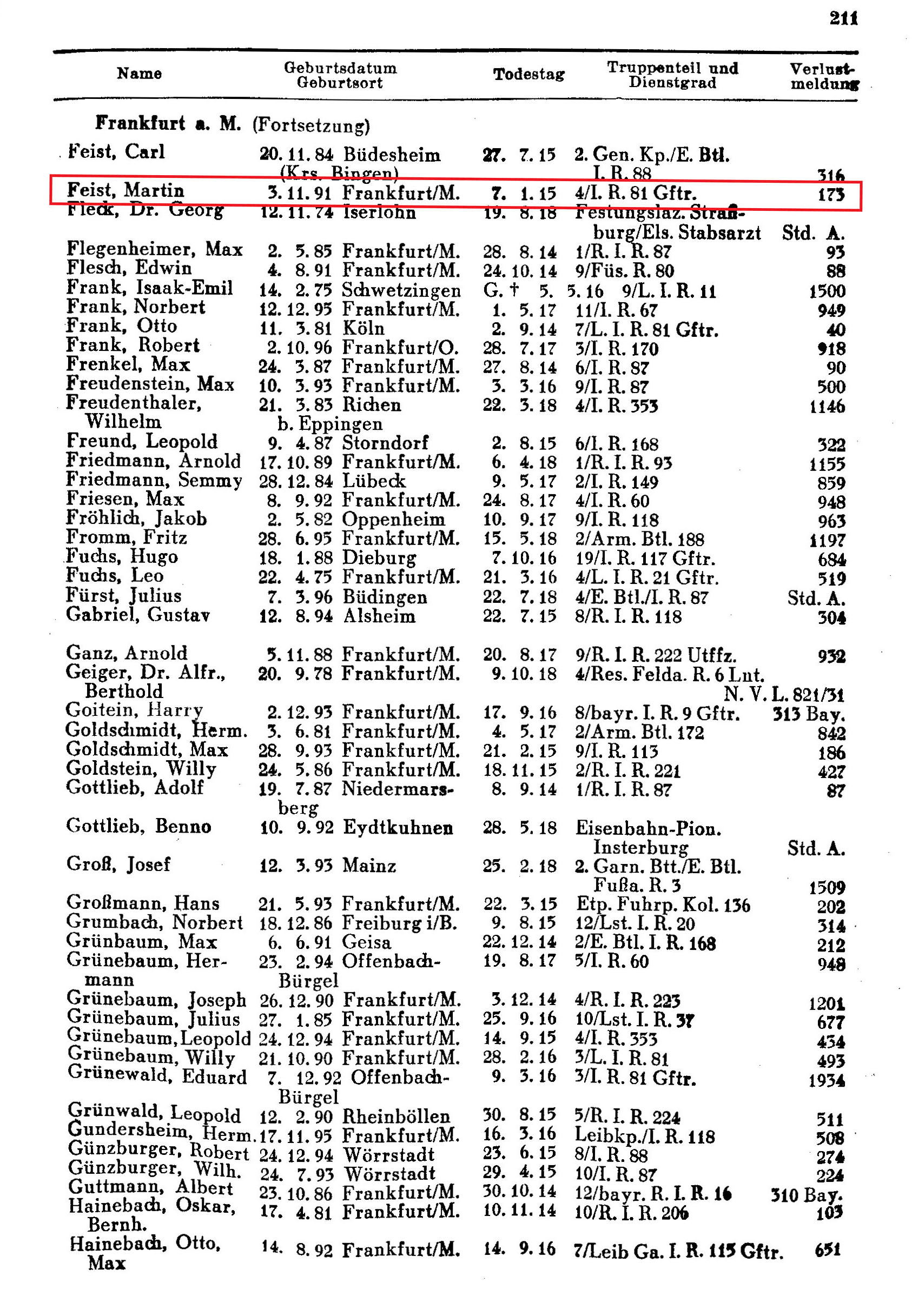 Martin was not the only German Jewish soldier to lose his life on Wednesday, January 7, 1915. The other German Jewish soldiers who lost their lives that day included:
Martin was not the only German Jewish soldier to lose his life on Wednesday, January 7, 1915. The other German Jewish soldiers who lost their lives that day included:
– .ת. נ. צ. ב. ה –
תהא
נפשו
צרורה
בצרור
החיים
Soldat Julius Asch, 5th Reserve Infantry Regiment, 3rd Battalion, 12th Company
Born in Breslau, April 20, 1897; Resided in Schonlanke
Soldat Siegfried Baendel, 21st Reserve Infantry Regiment, 3rd Battalion, 10th Company
Born in Gleiwitz, August 14, 1882; Resided in Gleiwitz
Soldat Martin Elsbach, 234th Reserve Infantry Regiment, 2nd Battalion, 5th Company
Born in Kassel, June 26, 1891; Resided in Walldorf
Gefreiter Otto Loser, 30th Reserve Infantry Regiment, 2nd Battalion, 7th Company
Born in Dusseldorf, July 3, 1888; Resided in Dusseldorf
Soldat Jakob Marx, 75th Infantry Regiment, 1st Battalion, 3rd Company
Born in Lehmen (Mosel), May 6, 1892; Resided in Gondorf
References
“cacao tube”, at http://www.marichesse.com/article-elle-s-est-collee-les-deux-levres-en-confondant-son-beurre-de-cacao-avec-un-tube-de-colle-forte-118792411.html.
“Honig mundete”, at https://steinhorster.blogspot.com/2016/02/burgerversammlung-koschale-eeten.html, and,
https://www.opentable.com/solevino-restaurant-and-sommergarten-a-la-provence.
“Theebomben”, at http://www.djk-adler-koenigshof.de/index.php/spielberichte/adlerfreunde/1094-adlerfreunde-besuchten-teekanne-in-duesseldorf
Martin Feist Collection at the Center for Jewish History
Martin Fiest Place of Burial, at FindAGrave
Einer von den 12000, (Illustration by Siegfried Ziegler), Der Schild, December 20, 1935, p. 5
Die Jüdischen Gefallenen Des Deutschen Heeres, Deutschen Marine Und Der Deutschen Schutztruppen 1914-1918 – Ein Gedenkbuch, Reichsbund Jüdischer Frontsoldaten, Forward by Dr. Leo Löwenstein, Berlin, Germany, 1932
Kriegsbriefe – gefallener Deutscher Juden, Reichsbund Jüdischer Frontsoldaten E.V., Berlin, Germany, 1935
And, an acknowledgement
I would like to extend my sincere thanks to my friend (and, Yiddish teacher / composer / choir director) Alexander Botwinik, for his assistance in accessing a copy of Kriegsbriefe – gefallener Deutscher Juden.
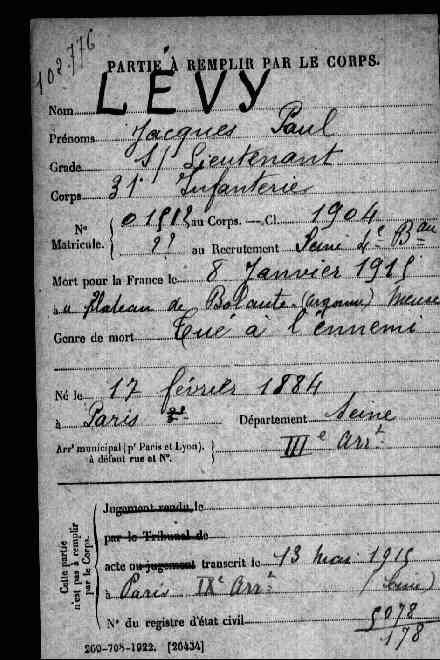
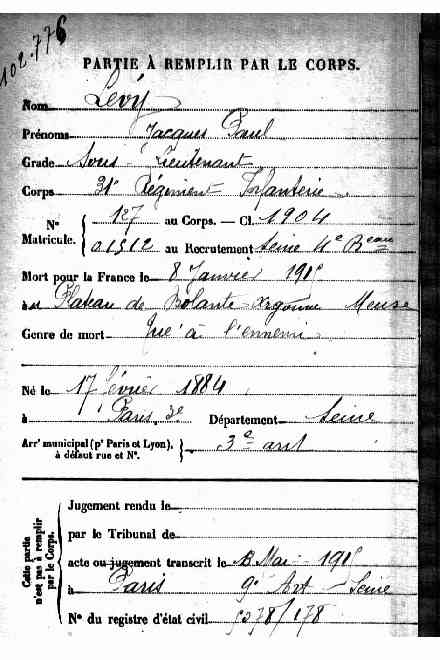 Chaque jour s’allonge la liste de nos jeunes héros, fauchés à l’aurore de leur carrière et dont la mémoire est déjà entourée de la triple auréole de la vertu, de la vaillance et du martyre. Nous avons, l’autre jour, cité le lieutenant Aboucaya, le lieutenant Oulman. Parlerons-nous du lieutenant Jacques Lévy? Les souvenirs qui s’attachent maintenant à lui sont si poignants que nous aurions hésité à y toucher, même d’une plume discrète, si au service qui a été célébré, à sa mémoire, dimanche dernier, dans l’oratoire de la rue de la Victoire, M. le grand-rabbin J.-H. Dreyfuss n’avait retracé sa carrière et évoqué ses vertus.
Chaque jour s’allonge la liste de nos jeunes héros, fauchés à l’aurore de leur carrière et dont la mémoire est déjà entourée de la triple auréole de la vertu, de la vaillance et du martyre. Nous avons, l’autre jour, cité le lieutenant Aboucaya, le lieutenant Oulman. Parlerons-nous du lieutenant Jacques Lévy? Les souvenirs qui s’attachent maintenant à lui sont si poignants que nous aurions hésité à y toucher, même d’une plume discrète, si au service qui a été célébré, à sa mémoire, dimanche dernier, dans l’oratoire de la rue de la Victoire, M. le grand-rabbin J.-H. Dreyfuss n’avait retracé sa carrière et évoqué ses vertus.

